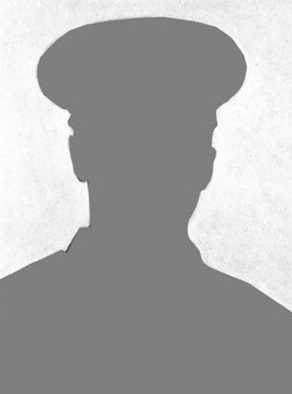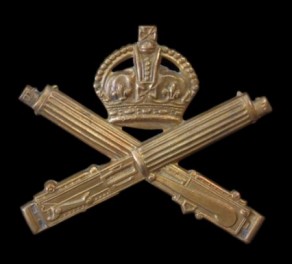Main CPGW Record
Surname: GOUGH
Forename(s): Arthur
Place of Birth: Skipton, Yorkshire
Service No: 24743
Rank: Sergeant
Regiment / Corps / Service: Machine Gun Corps (Infantry)
Battalion / Unit: 49th Battalion
Division: 49th (West Riding) Division
Age: 22
Date of Death: 1918-04-12
Awards: ---
CWGC Grave / Memorial Reference: Panel 154 to 159.
CWGC Cemetery: ---
CWGC Memorial: TYNE COT MEMORIAL
Non-CWGC Burial: ---
Local War Memorial: SKIPTON, YORKSHIRE
Additional Information:
Arthur Gough was the son of James Henry and Elizabeth Ann Gough, née Chester. James was born at Bradford and Elizabeth at Skipton, Yorkshire.
1901 Skipton, Yorkshire Census: 22, Hardcastles Yard - Arthur Gough, aged 4 years, born Skipton, son of John Wm [sic] and Annie Gough.
1911 Skipton, Yorkshire Census: 8, Gas Street - A. Gough, aged 14 years, born Skipton, son of H. and A. Gough.
Arthur is listed in the Nominal Roll of the 1/6th Battalion Duke of Wellington's (West Riding Regiment): Pte A. Gough.
British Army WW1 Medal Rolls Index Cards: Pte Arthur Gough, 3257, West Riding Regiment and Sgt, 24743, Machine Gun Corps. Theatre of War first served in: (1) [France]. Date of entry therein: 14 April 1915.
Early in 1918 Machine Gun Battalions were formed. This was done by bringing 4 Machine Gun Companies together to form a battalion. The battalion then took the number of their Division.
See also: ‘Guiseley Terriers: A Small Part in The Great War – A History of the 1/6th Battalion, Duke of Wellington’s (West Riding) Regiment’ by Stephen Barber (2018).
Data Source: Local War Memorial
---
Entry in West Yorkshire Pioneer Illustrated War Record: ---
---


Regiment / Corps / Service Badge: Machine Gun Corps (Infantry)

Divisional Sign / Service Insignia: 49th (West Riding) Division
Data from Soldiers Died in the Great War 1914 - 1919 Records
Soldiers Died Data for Soldier Records
Surname: GOUGH
Forename(s): Arthur
Born:
Residence:
Enlisted: Skipton
Number: 24743
Rank: Sergt
Regiment: Machine Gun Corps
Battalion: (Infantry)
Decorations:
Died Date: 12/04/18
Died How: Killed in action
Theatre of War: France & Flanders
Notes: Formerly 3257, W. Riding Regt.
Data from Commonwealth War Graves Commission Records
CWGC Data for Soldier Records
Surname: GOUGH
Forename(s): Arthur
Country of Service: United Kingdom
Service Number: 24743
Rank: Serjeant
Regiment: Machine Gun Corps (Infantry)
Unit: 49th Bn.
Age: 22
Awards:
Died Date: 12/04/1918
Additional Information: Son of Mr. J. H. and Mrs. E. A. Gough, of 24, Wesley Place, Skipton, Yorks.
---
---
View Craven Herald Articles
View Craven Herald Articles

04 August 1916
"ONE OF THE BRAVEST" – Generous Tributes to the Memory of Sergt. Stork
In letters received by the families of Sergt. Stork and Corporal Ernest Cowgill, of the 1/6th Duke of Wellington’s West Riding Regiment, it appears that on Tuesday, July 25th, these two men, along with their pal, Pte. Roy Windle, were in a dugout in the front line when an enemy shell burst near them, killing Sergt. Stork and Corporal Cowgill and seriously wounding Pte. Windle, who was removed to hospital.
Sergt. Fred Stork was the son of Mr. Frank Stork; of 31, Russell Street, Skipton, and in civil life was a weaver at Messrs. Smith Hartley’s, Union Mill, Skipton. Twenty-three years of age, he was a young man of exceptional promise, and as the following letters will show, had endeared himself to both the officers and men of the Skipton Territorials, with which he had been for over three years.
In a letter to deceased’s father, Capt. W. J. M. Sproulin says:– “During a bombardment of our line yesterday afternoon he (Sergt. Stork) went round to one of the guns in the front line, and while in a dugout sheltering, a shell burst into it and killed him instantly, together with the other occupants of the dugout. His death is a very great loss to me and the remainder of the company. He was an extremely willing and gallant soldier, and had been under me since September 1913. I sincerely trust that the knowledge that he died bravely doing his duty for King and Country will be some consolation in your great bereavement.”
Lieut. Ralph M. Robinson has written as follows:– “I must write and tell you how very deeply I sympathise with you in your great sorrow. I also want you to know what a real personal loss your son’s death is to myself. In all the months we have soldiered together I never remember having had a single difference with him. He was one of the bravest, most hardworking, and most unselfish fellows I have ever met: his work in the trenches has been wonderful all through, and we shall miss him very badly. You will be glad to hear that he suffered no pain. He and his friend, Ernest Cowgill, were killed instantaneously by one shell during a bombardment yesterday. Roy Windle, who was with them, got a nasty wound, but the doctor thinks well of his chances. Mr. Shipman, of Long Preston, took the funeral this morning. All the machine gun corps officer were present, as well as several of us from the West Ridings. He was buried in a beautiful little valley between two woods with a river at the bottom, between rows of poplar trees. I know how deeply your sorrow must be at the loss of your son, but at the same time if you only knew what both the officers and men thought about him you would be the proudest father in Craven.”
A letter from Lieut. J Hunter Ward contains the following passages:– “I have no words in which to tell you how much he was valued, not only in the company, but by all the old members of the 6th Battalion. I never remember a case where more enquiries were made as to whether the news was correct or not, nor more regret expressed when the sad news was verified. During this present operation he and I worked together all the time under conditions which show men in their true colours. He was entirely fearless and fearfully keen on any possible chance of getting a gun into action and hitting the Germans. His cheerfulness in the trenches was part of his sterling qualities as a non-commissioned officer; I loved him as a brother. It is only about ten days that I wrote home telling my people it my great good fortune in having such a fearless and hardworking friend. I am sure that I can say but little to ease the pain you feel by his death, but I would like to say in conclusion that should it be fate to be killed in this campaign I could wish that I might die as your son with my face to the enemy and fearing nothing.”
Mr. Stork has also received letters from Rev. B. Shipman, Chaplain, and Corporal A. Gough, a Skipton soldier. The former says:– “It is indeed a sad affair that I have to deliver to you the news that we buried your son this morning close to the front line. A cross will shortly be placed on his grave. I had the privilege of knowing him; and was especially interested in him because I knew his uncle well – Fred Stork of Long Preston. It may help you to know that your son was very popular and was a very good soldier. His captain has said there was non better and he was a very good son. May God help and strengthen you to meet this cruel blow.”
Corporal Gough writes:– “Our section and myself will miss him very much, as he was well liked by all the lads and by all who knew him.”
04 August 1916
SKIPTON'S PART IN THE GREAT ADVANCE – MORE LOCAL MEN KILLED AND WOUNDED: A PROMISING AND FEARLESS YOUNG N.C.O.
Corporal Ernest Cowgill, son of Mr. Tom Cowgill, Primrose Hill, Skipton, lost his life at the same time as Sergt. Fred Stork through the exploding of a shell in a dug-out. He died instantaneously. When the war broke out he was in camp with the Skipton Territorials, and went into serious training for the Front. He went out to France with the 1/6th Duke of Wellington’s Battalion in April, 1915. In civil life he was a weaver and in his youth was a member of the 1st Skipton Boy Scouts (under the late Lieut. Henry Brian Fisher), and the Skipton Bulldogs.
Captain Sproulin has written to the parents as follows:– “It is with deep regret that I have to inform you of the death of you son, Lance-Corp. Cowgill. He, with Sergt. Stork, of the same section, were sheltering in a dug-out during an especially fierce German bombardment when a shell burst through, killing all the occupants instantly. His loss has been a very great one to me; a more promising, keen, and fearless young N.C.O. one could not have wished for. During the whole time he has been under my command he has been all one could have wished for. I sincerely trust that the knowledge that he died bravely doing his duty to the last will be some comfort to you in your great bereavement.”
In a letter to the family Second-Lieut. J. Hunter Ward writes:– “It is with the deepest regret that I must tell you of your son’s death. He was killed by a shell bursting in a dug-out, dying instantaneously. I have just written my tribute to Sergt. Stork, who was killed at the same time. More than can be said for him I could not say for any man, but as much I can say of your son. He was a charming lad, and was cheerful and smiling in circumstances when brave men could have been pardoned for giving way. As an N.C.O. he was most willing, and his thorough knowledge of his work was second only to his interest in it. I feel that I must also pay tribute to his virtues as a man, quite apart from his splendid characteristics as an N.C.O. He was a man whom I moved to speak to, and perhaps through that and censoring his letters, I know more of his home life than I do of some of the other men, and through this I understand how much you meant to him and he to you. I feel therefore that anything I can say can lessen the pain you feel. One thing, however, that I know will please you is that he had a Christian burial attended by his officers and his comrades in the section who all feel his loss very much indeed. When circumstances permit I shall be pleased to let you know his resting place. He was killed on the 25th, about 12:30 p.m. Trusting that you will find consolation in the manner of his death, and assuring you of my profound sympathy. – (P.S.) He was probably a full Corporal at the time of his death, as I forwarded his name for promotion some time ago and expect confirmation at any time.”
Rev. Shipman, chaplain, has also written as follows:– “It is a sad task before me when I have to tell you that I buried your son this morning in company with eight other brave lads all killed yesterday. His last resting place is that of a soldier close to the firing line. A cross will shortly be put up over his grave. It is my prayer that God may help and strengthen you in this sad time.”
A COMPLIMENT FROM LIEUTENANT ROBINSON
Lieut. Ralph M. Robinson writes:– “I cannot tell you how sorry I am to hear of the death of your son Ernest, or how deeply I sympathise with you and your husband in your great loss. I had been talking to him not long before. I have never met a nicer lot of fellows than the Machine Gun Section that came out with me from Doncaster, and there was none I liked better, nor could trust more fully, than your boy. He was so quick and clever, and could turn his hand to anything. His death was quite instantaneous, so that he suffered no pain at all. He was hit by the same shell as his friend, Fred Stork, and we buried them together in the little cemetery here. Mr. Shipman, the vicar of Long Preston, took the service, and all the officers in our Machine Gun Company were present, as well as several from the 6thWest Riding. We shall all miss him very badly, and it seems hard that such a splendid fellow should have died so young. But however long he had lived he could not have had a more painless or a more glorious end.”
Corporal A. Gough writes:– “I write these few lines with deepest regret to inform you of the death of your son Ernest. He was killed yesterday with Sergt. Stork. I can assure you he was killed instantaneously and he suffered no pain whatsoever. Our section and myself will miss him very much, as he was well liked by all the lads, and by all who knew him. He was buried in a very quiet spot behind our lines, and he was buried decently. I ask you again to accept my greatest sympathy and also that of the section he was in.”
07 December 1917
MORE SKIPTON CASUALTIES – LANCE CORPORAL FRED BARRETT
Official news was also received yesterday of the death in action on November 23rd of Lance Corporal Fred Barrett, Duke of Wellington’s Regiment, whose wife lives at 65, Newmarket Street, Skipton. The distressing news had come to hand a day or two earlier in a letter from Major Gilbert Tanner, who, after expressing his sympathy with the bereaved wife, continued:– “Your husband was killed by a shell which so seriously wounded Second-Lieutenant Atkinson (Settle) that he died a little while afterwards. Your husband was killed instantly and suffered no pain. He was one of the best soldiers in my company, and was marked out for further promotion.”
Sergeant Arthur Gough, a well known Skipton soldier, has also written Mrs. Barrett a touching letter in which he says:– “Your husband was well liked by all who knew him. As you know, Fred was a great pal of mine. I have known him a number of years, and I assure you his death is a great loss to me. One great consolation is that he laid down his life as a soldier, fighting for his King and Country.”
Deceased was 26 years of age and was the youngest son of Mrs. Barrett, of Russell Street, Skipton. He enlisted on October 12th 1914, and went to the Front in the following Spring. He was formerly in the employ of the Craven Lead Works, and played cricket with the Church Institute Club and football (outside left) with the Cononley Association Football Club. His elder brother, Private Arthur Barrett, Northumberland Fusiliers, lost his right arm in the early months of the war, and another brother, Corporal George Barrett, is still in France with the local Territorials.
31 May 1918
CRAVEN AND THE WAR
WOUNDED AND MISSING
Sergeant Gough, Machine Gun Corps, son of Mr. Henry Gough, Wesley Place, Skipton, is officially reported as missing since April 12th. An officer stated that when he last saw him Sergeant Gough was working hard at his gun.
16 April 1920
GOUGH – In loving remembrance of Sergeant A. Gough, M.G.C., who was reported missing April 13th, 1918. Later presumed killed.
“Transplanted from the toil of war into the Peace of God.”
From Aunts and Cousins, 6 Primrose Hill, Skipton.
15 April 1921
GOUGH – In loving remembrance of Sgt. A. Gough, M.G.C., who was reported missing on April 12th, 1918, and later presumed killed.
From his Aunts and Cousins, 6 Primrose Hill, Skipton.
View West Yorkshire Pioneer Articles
View West Yorkshire Pioneer Articles

07 December 1917
MAJOR’S TRIBUTE TO A SKIPTON HERO
News has born received from ,the Infantry Records Office, York, that Lance-Corporal Fred Barrett, of the Duke of Wellington’s West Riding Regiment, youngest son of Mrs. Barrett, of Russell Street, Skipton, the husband of Mrs. Barrett, of 65, Newmarket Street, Skipton, was killed in action on November 23rd. Lance-Corpl. Barrett, who was 26 years of age, enlisted in October, 1914, and went out to France in April, 1915. He was formerly employed at the Craven Lead Works. He was also a playing member of the Church Institute Cricket Club, and played outside left with the Cononley Association Football team. Major Gilbert Tanner, in a letter to the deceased soldier’s wife, states:– “I am extremely sorry to have to inform you that your husband was killed on November 23rd by a shell which also so seriously wounded Second Lieutenant Atkinson that he died a little while afterwards, Your husband was killed instantaneously, and we are sure suffered no pain. He was one of the best soldiers in my company, and was marked out for further promotion.”
Sergt. Arthur Gough, a Skipton man with the Territorials, has also written a letter of sympathy, in which he states:– “Your husband was well liked by all who knew him. As you know Fred was a great pal of mine. I have known him a number of years, and I assure you that it is a great loss to me. One great consolation is that he laid down his life as a soldier fighting for his King and country.
Mrs. Barrett has two other sons, Pte. Arthur Barrett, who has had his right arm taken off, and Corporal George Barrett, who is in France with the Territorials.
Comment on this Soldier Record
You can leave comments on this soldier record. Please note all comments will be manually approved before they appear on the website.




No comments yet.